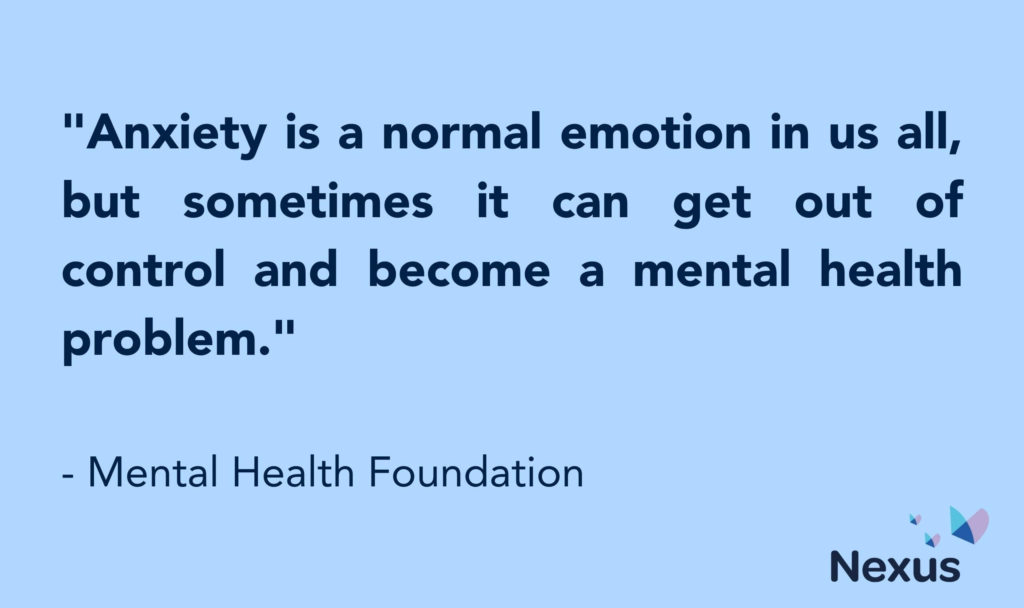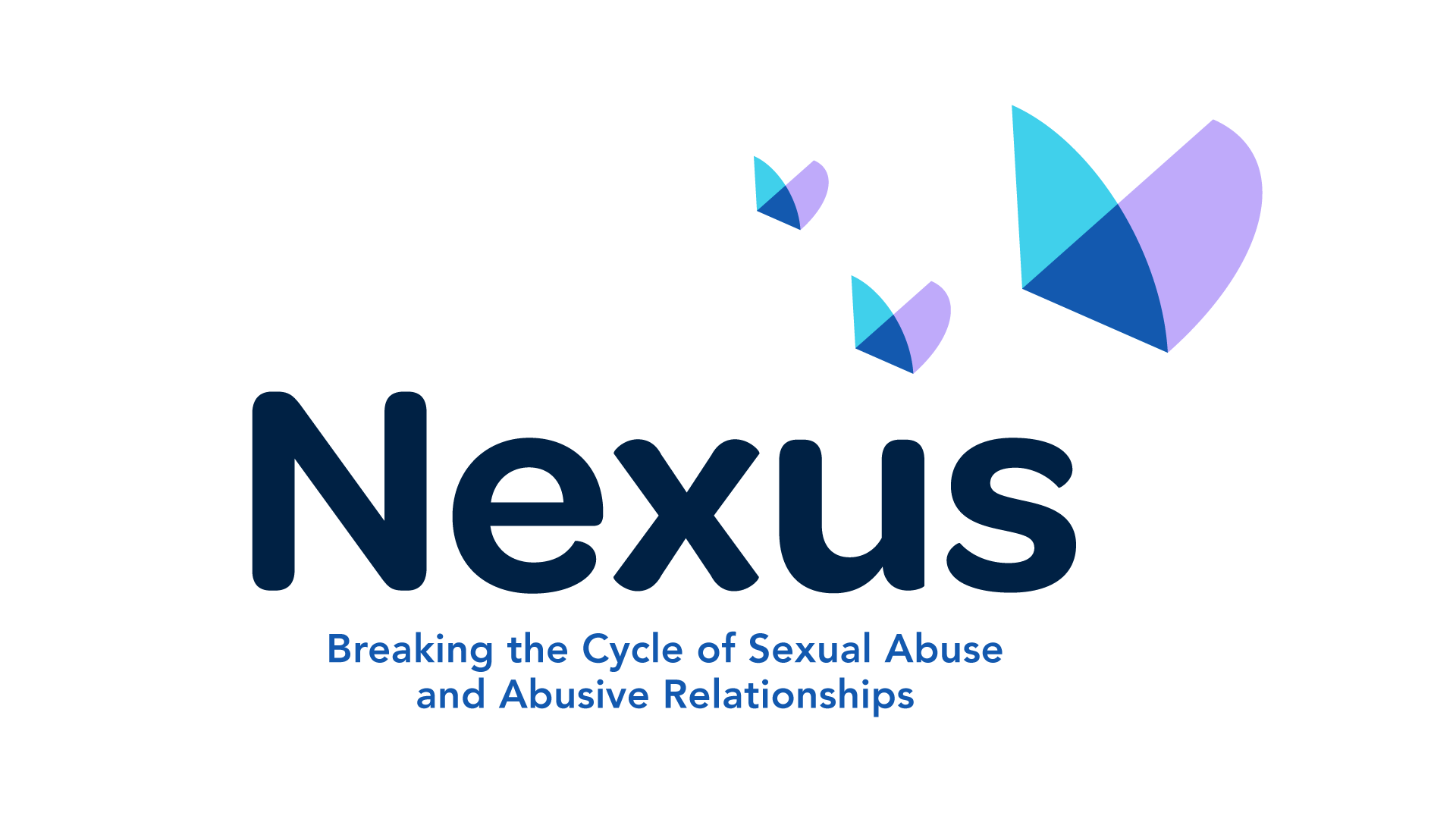Abuse and Anxiety
Mental Health Awareness Week runs from 15th – 21st May and this year’s theme is ‘Anxiety’. In this blog post, we’ll talk about what anxiety is, the impact it can have on you, and the relationship between abuse and anxiety.

What is Anxiety?
So what actually is anxiety? You’ve probably heard of it – you may have even experienced it yourself. Experiencing anxiety is very common. In fact, according to the Mental Health Foundation, between April 1st 2022 and March 31st 2023, an average of 37.1% of women and 29.9% of men in the UK reported high levels of anxiety. But what does this mean? As the Mental Health Foundation note above, it’s a normal emotion that most people have the ability to feel, but anxiety can look different for different people. And for some people, it can have a severe impact on how they live their lives.
Anxiety might look like…
- Increased heart rate
- Headaches
- Loss of appetite
- Breathlessness
- Chest pain
- Feeling tense or nervous
- Finding it difficult to relax
- Having trouble sleeping
- Not being able to concentrate
- Feeling or acting irritable
The main thing to remember is that anxiety is a normal response to feeling stress, pressure, or threat. Some people might refer to it as feeling ‘nervous’ or having butterflies in your stomach. It can sometimes be a helpful feeling because it can help us to stay alert and responsive. However, “If your anxiety is ongoing, intense, hard to control or out of proportion to your situation, it can be a sign of a mental health problem” (Mental Health Foundation).
How Does Abuse Affect Anxiety?
Abuse and anxiety are often linked. Someone who is impacted by abuse may…
- Feel they lack control over their own body
- Fear the abuse will continue or happen again
- Be afraid to trust people
- Be on high-alert at all times
- Feel chronically stressed
- Experience physical anxiety symptoms such as panic attacks
They may have experienced these feelings before, or they may be caused by being impacted by sexual abuse or abusive relationships. Abuse can therefore lead to frequent or ongoing feelings of anxiety developing, or can make someone who had already experienced anxiety before abuse feel anxious more frequently or more intensely.
How Abuse Affects Mental Health
Overall, abuse can have a negative impact on a person’s mental health and can be linked to other mental health challenges, such as depression and chronic stress, not only in the short-term, but for a long time after the abuse has stopped too.
It is completely normal to experience mental health challenges if you’ve been impacted by abuse. You have experienced trauma, a natural response to events (one-off or ongoing) that might cause feelings of fear, distress, shame, humiliation, guilt, abandonment, and other similar feelings (Mind).
But why is this the case?
Well, in an abusive relationship, the perpetrator uses a range of tactics to exert power and control over their intimate partner, their parent or carer, their child or a person they care for, a friend or another family member.
These tactics can lead to feelings of shame, guilt, and fear, and may include:
- Physical harm or threats of harm, including sexual harm
- Belittling, name-calling, humiliation, gaslighting (repeatedly questioning your reality, including your memory and sanity)
- Monitoring or tracking via technology
- Isolation from family and friends
- Controlling money or access to money
Experiencing these things from someone you trust is stressful, upsetting, and confusing, and that’s why it can lead to mental health challenges, including anxiety, depression and chronic stress.
Anxiety and Emotional Abuse
So let’s talk about anxiety and emotional abuse. The truth is, the impact of emotional abuse is no different to the impact of other types of abuse.
Emotional abuse, also referred to as psychological abuse, “involves the regular and deliberate use of a range of words and non-physical actions used with the purpose to manipulate, hurt, weaken or frighten a person mentally and emotionally” (Domestic and Sexual Abuse Helpline)
Because it’s non-physical, emotional abuse may be harder to spot, but that doesn’t make it any less impactful than other forms of abuse.
Being impacted by emotional abuse can chip away at your confidence, your self-worth, and how you see yourself overall. It may make you doubt your ability to do certain things, and can lead to feeling anxious – both about issues in your relationship, and other things in your life, such as work, friendships, studies, finances, and your health.
And again, feeling this way is completely normal. Perpetrators of abuse will sometimes try to use your mental health against you – they may call you crazy, say you’re unreliable because of your mental health challenges, or guilt-trip you for feeling the way you do. This is not acceptable. Your feelings are valid.
Anxiety After Abuse
Someone who has been impacted by any form of abuse might experience anxiety whilst the abuse happens, immediately after, and/or for a long time afterwards. They might not experience it for days, weeks, or years, but then could be triggered (have a strong response) – for example by a smell, a sound, a person, a memory – and start to feel anxious at that point.
Again, this is completely normal.
Being impacted by abuse can cause trauma. When someone experiences trauma, their brain reacts in order to survive. This happens in the moment, but can also happen in the future when the same or similar feelings that were experienced at the time are stirred up again. The brain automatically goes into survival mode, meaning that feelings like anxiety can be triggered, even if there is no immediate or actual danger.
How We Can Help
At Nexus, we understand that anxiety and abuse can have a detrimental impact on your wellbeing. We have a range of support services and therapeutic interventions that can help you if you’ve been impacted by sexual abuse and abusive relationships. This includes our sexual abuse counselling service which is available for children and young people from age 4, adult survivors of child sexual abuse, and adult survivors of adult sexual abuse. Our services operate on a person-centred basis and are available across Northern Ireland free of charge. To find out more, please contact us. If you are ready to make a referral to get support, you can do so here.
The Domestic and Sexual Abuse Helpline is available 24/7, 365 days a year for anyone who has been directly or indirectly impacted by sexual abuse and abusive relationships. This includes people who are worried about someone they know.
Call 0808 802 1414, email help@dsahelpline.org, or chat online via dsahelpline.org





